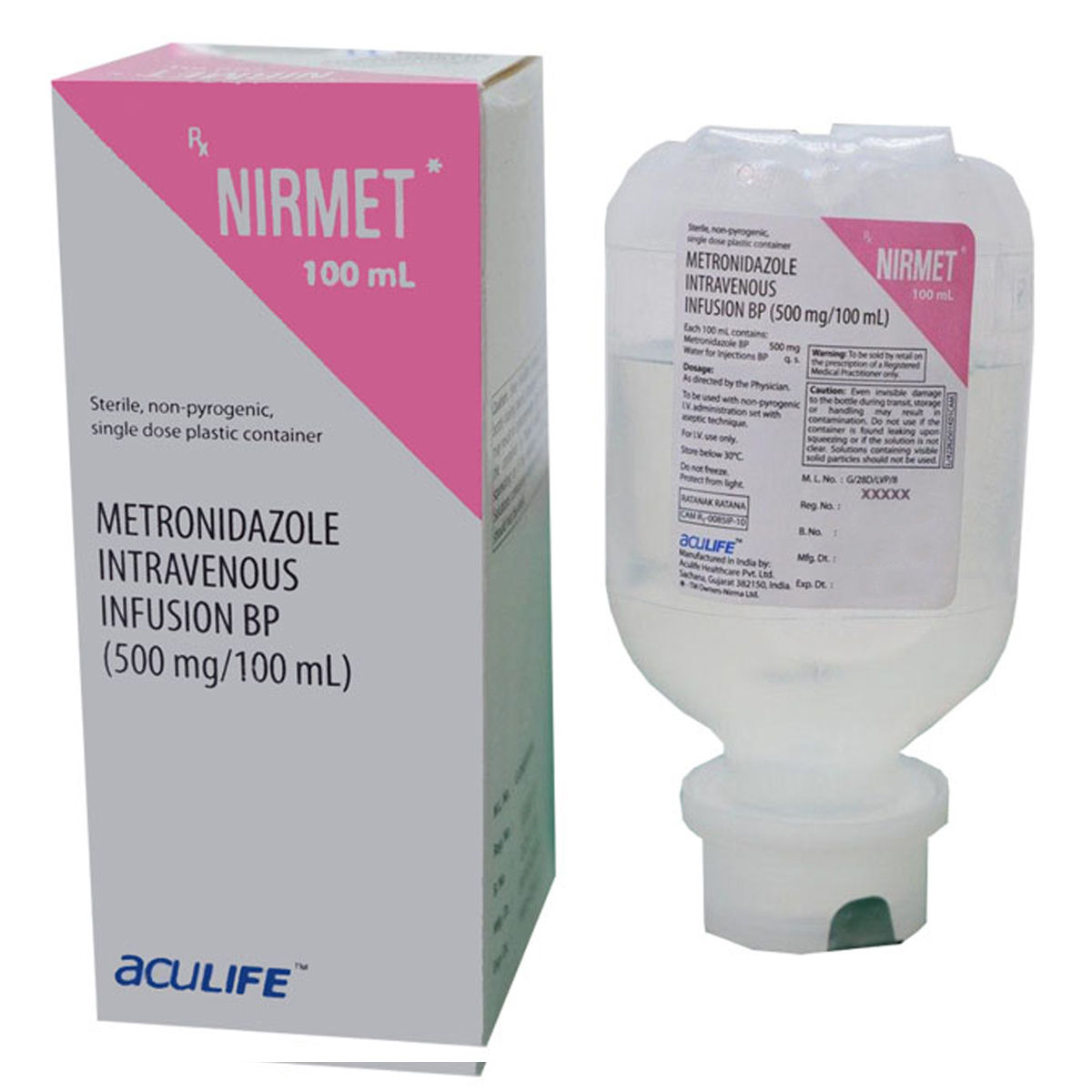Met-Tara Injection 100 ml
₹22.18*
MRP ₹24.64
10% off
₹20.94*
MRP ₹24.64
15% CB
₹3.7 cashback(15%)
Free Delivery
With Circle membership
(Inclusive of all Taxes)
This offer price is valid on orders above ₹800. Apply coupon PHARMA10/PHARMA18 (excluding restricted items)
Know Your Delivery Time
Provide Delivery Location

Whats That

Secure Payment

India's Most Trusted Pharmacy

Genuine Products
Composition :
Manufacturer/Marketer :
Consume Type :
Return Policy :
Expires on or after :
About Met-Tara Injection
Met-Tara Injection belongs to a group of medicines known as anti-bacterial agents used to treat severe bacterial infections of the bone, skin and skin structure, blood, joint, abdomen, central nervous system, respiratory, gynaecological infections, meningitis (infection of the membranes that surround the brain and spinal cord), and endocarditis (infection of the heart lining and valves).
Met-Tara Injection contains Metronidazole, which suppresses protein synthesis by interacting with DNA and causes helical DNA structure loss and strand breakage. As a result, it induces cell death in susceptible organisms. Thereby Met-Tara Injection treats bacterial infections.
Met-Tara Injection will be administered by a healthcare professional; do not self-administer. Some common side effects of Met-Tara Injection are nausea, vomiting, diarrhoea, constipation, and injection site reaction. These side effects are temporary and may get resolved after some time. However, if any of the side effects persist or worsen, contact the doctor.
Let your doctor know if you are allergic to metronidazole. Consult your doctor if you are pregnant, planning to get pregnant, or if you are breastfeeding. Do not operate heavy machinery or drive after taking Met-Tara Injection as it may cause dizziness and drowsiness. Avoid consumption of alcohol while on treatment with Met-Tara Injection as it may cause unpleasant side effects.
Uses of Met-Tara Injection
Medicinal Benefits
Met-Tara Injection belongs to a group of medicines known as anti-bacterial agents used to treat severe bacterial infections of the bone, skin and skin structure, blood, joint, abdomen, central nervous system, gynecologic, respiratory infections, meningitis (infection of the membranes that surround the brain and spinal cord), and endocarditis (infection of the heart lining and valves). Met-Tara Injection contains Metronidazole, which suppresses protein synthesis by interacting with DNA and causes helical DNA structure loss and strand breakage. As a result, it induces cell death in susceptible organisms. Thereby Met-Tara Injection treats bacterial infections.
Side Effects of Met-Tara Injection
- Nausea
- Vomiting
- Diarrhoea
- Constipation
- Injection site reactions
Directions for Use
Storage
Drug Warnings
Do not take Met-Tara Injection if you are allergic to any of the components. Consult your doctor if you are pregnant, plan to get pregnant or if you are breastfeeding. Do not operate heavy machinery or drive after taking Met-Tara Injection as it may cause dizziness and drowsiness. Inform your doctor if you have bone marrow depression/low blood count, kidney impairment, CNS disorder, liver or heart problems, peripheral neuropathy, epilepsy, Crohn's disease (a condition in which the body attacks the lining of the digestive tract), yeast infection, oedema (swelling), or blood disorders.
Therapeutic Class
Drug-Drug Interactions
Drug-Food Interactions
Diet & Lifestyle Advise
- It would be best to take probiotics after taking the full course of Met-Tara Injection to restore healthy bacteria in the intestine that may have been killed. Taking probiotics after antibiotic treatment can reduce the risk of antibiotic-associated diarrhoea. Certain fermented foods like yoghurt, cheese, sauerkraut and kimchi can help restore the intestine's good bacteria.
- Include more fibre-enriched food in your diet, as it can be easily digested by gut bacteria which helps stimulate their growth. Whole grains like whole-grain bread, and brown rice, should be included in the diet.
- Avoid intake of alcoholic beverages with Met-Tara Injection as it can make you dehydrated and affect your sleep. This can make it harder for your body to aid Met-Tara Injection in fighting off infections.
Habit Forming
How Met-Tara Injection Works
What if I have taken an overdose of Met-Tara Injection
Alcohol
Unsafe
You are recommended not to consume alcohol along with Met-Tara Injection to avoid unpleasant side effects such as stomach pain, nausea, vomiting, flushing, and headache.
Pregnancy
Caution
Please consult your doctor. Met-Tara Injection should be used in pregnant women only if clinically needed, and the benefits outweigh the risks.
Breast Feeding
Caution
Consult your doctor if you are a nursing mother. Your doctor will weigh the benefits and potential risks before prescribing Met-Tara Injection .
Driving
Caution
Met-Tara Injection may cause dizziness and drowsiness; thus, avoid operating machinery or driving vehicles unless you are alert.
Liver
Caution
Met-Tara Injection to be taken with caution, especially if you have a history of liver diseases/conditions. Your doctor may adjust your dose depending upon your liver condition.
Kidney
Caution
Met-Tara Injection to be taken with extreme caution, especially if you have a history of kidney diseases/conditions. Your doctor may adjust your dose depending upon your kidney condition.
Children
Consult your doctor
Limited information about the use of Met-Tara Injection in paediatric patients. Please seek medical advice. Your doctor will weigh the benefits and risks before prescribing this medicine to your child.
Country of origin
Author Details
We provide you with authentic, trustworthy and relevant information
FAQs
Disclaimer
Product Substitutes
Reference
- https://dailymed.nlm.nih.gov/dailymed/fda/fdaDrugXsl.cfm?setid=d46870f5-e2b1-46bd-8413-4a0a8bcf3175&type=display
- https://www.medicines.org.uk/emc/files/pil.13293.pdf
- https://www.medicines.org.uk/emc/product/1842/smpc#gref
- https://www.nhs.uk/medicines/metronidazole/about-metronidazole/
- https://www.drugs.com/drug-interactions/metronidazole-index.html?filter=3





_0.jpg?tr=q-80)






